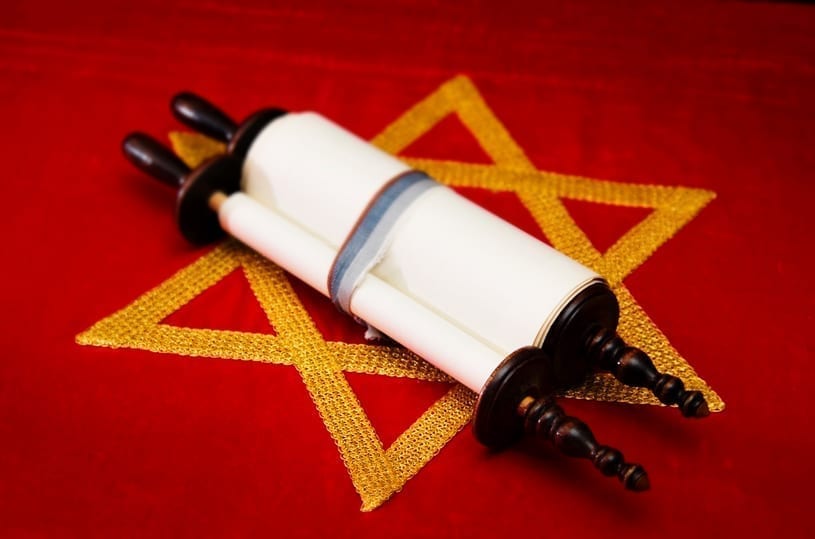Reading the Megillah
One should wear Shabbos clothes at night and during the day of Purim in order to honor the day and the mitzvah of reading the Megillah.
One has to have in mind to fulfill his obligation to read the Megillah, and everyone should stand during the brachos before and after the reading. If one does not hear a few words from the reader because of the noise he should himself read the words he missed, even if he is reading from a printed copy. He may even say those words by heart if he knows them. The minhag is that everyone recites the brachah after the Megillah together.
Women are obligated to hear the Megillah as well, since they were also saved in the miracle of Purim. Therefore, if they do not go to shul to hear a reading, or if it is impossible for them to hear the shul reading properly from the women’s section, someone must read for them in their homes. They should be reminded not to speak during the reading and not to take their minds off it. If the reader for the women has already read Megillah in shul, it is preferable that the women should all make their own brachah “lishmo’a mikra Megillah.” The brachah after the Megillah should only be said in the presence of ten people, in order to publicize the miracle. Therefore, when someone reads for women he should ensure there are at least ten women present before making the brachah after Megillah.
There is an obligation to teach the children (both boys and girls) to listen to the Megillah, but one should not bring very young children to shul because they might disrupt the reading and prevent people from hearing it.
When reading Megillah during the day one should have in mind during the brachah of Shehecheyanu to cover the other mitzvos of the day – Mishloach Manos, Seudas Purim and Matanos L’evyonim. The Sefardim do not make Shehecheyanu during the day, so they need to have in mind to cover all of the mitzvos with the Shehecheyanu made at night.
Mishloach Manot – The Purim Basket
Every man is required to send two different food items to at least one friend on Purim. “Manos” refers to food items which are ready to eat without needing any further preparation – thus if one sends meat or fish it should be cooked, not raw. One may send wine, sweets of all kinds, fruit, honey or any other type of ready-for-consumption food or drink.
Women are also required to send Mishloach Manos and Matanos L’evyonim – just that men should send to men while women should send to women. The minhag is that married women rely on their husband to fulfill Mishloach Manos, and children (so long as they are dependent on their parents) likewise rely on their father. Nevertheless, it is good if married women and children perform the mitzvah themselves.
Both Mishloach Manos and Matanos L’evyonim should be done by day, not by night. It is acceptable to ask children to deliver Mishloach Manos, and there is no concern they will not deliver them properly.
Matanot L’evyonim – Gifts to the Poor
Every Jew, even one who is himself dependent on Tzedakah for survival, is required to give a gift to two poor people on Purim. The minimum value of this gift is the amount that would cover one normal meal. On Purim one should not be suspicious that a person asking for Tzedakah is a swindler – whoever asks for Tzedakah on Purim should be given.
Women are also required to give Matanos L’evyonim, and they may give to women or men. As with Mishloach Manos, the minhag is that married women rely on their husbands to perform this mitzvah, just as children rely on their father, but it is good if they perform it themselves.
The Rambam writes that it is better to spend a lot on Matanos L’evyonim than to spend a lot on one’s festive meal or on Mishloach Manos, because the greatest simchah for Hashem is to make orphans and widows happy. Therefore, one who gladdens the heart of the downtrodden is likened to the Shechinah (the divine Presence), as the passuk says, “[He] revives the spirit of the lowly and rejuvenates the heart of the oppressed.”
Seudat Purim – The Festive Meal
Even though the main festive meal of Purim is during the day, at night one should also make a meal slightly more festive than usual. One should also light candles in honor of Purim.
One is required to eat and drink and be merry on Purim. The festive meal should be held during the day and it should be embellished with plenty of food and drink and much rejoicing. One is required to drink on Purim “until he does not know the difference between arur Haman and Baruch Mordechai “- meaning one should stop drinking before reaching that point. One is required to drink more than normal in order to be able to remember the great miracle of the salvation and then one should go to sleep – for while asleep one does not know the difference between arur Haman and Baruch Mordechai.
Performing melachah on Purim
One should not perform melachah on Purim. Women should not do laundry and the like, and men should not get their hair cut on Purim by a Jew. Whoever works on Purim will never see a sign of brachah from that work. However, one may have melachah done for him by a non-Jew. One may do melachah for the sake of a mitzvah, and certainly for the benefit of Purim itself one may do any kind of melachah.





